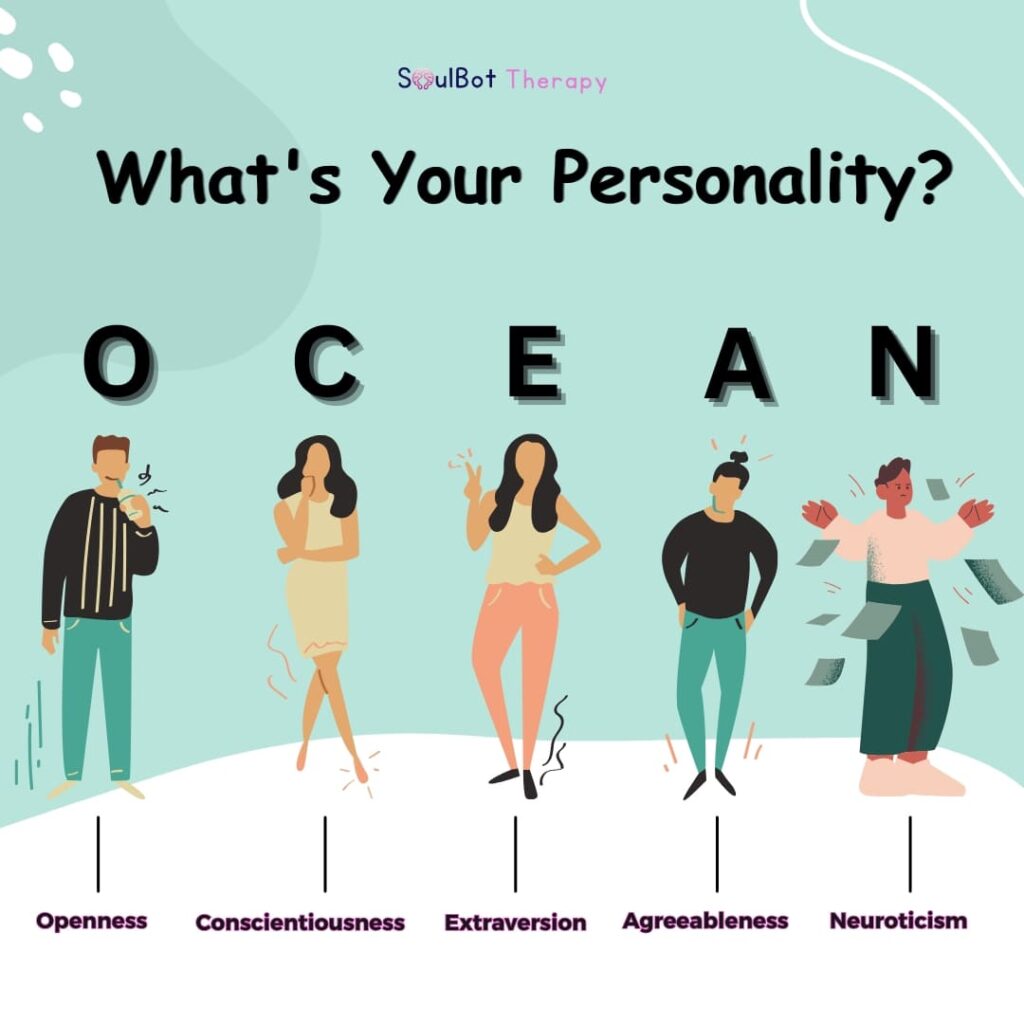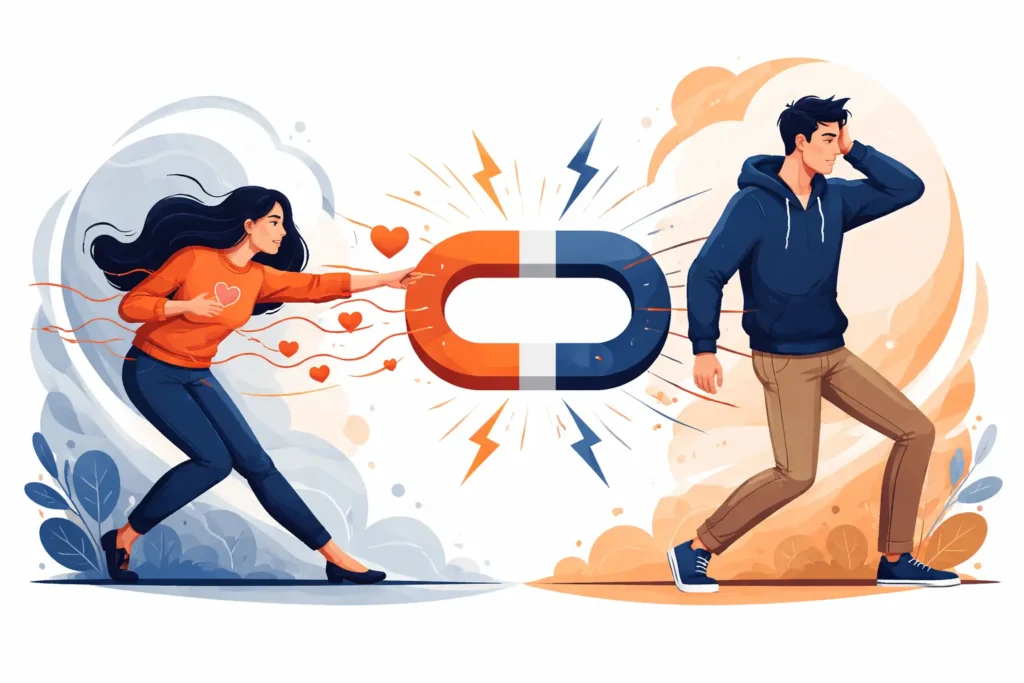Big Five Personality Traits help explain why some people are natural risk-takers while others prefer the comfort of familiarity. Understanding personality offers valuable insights into these differences. For instance, while some individuals thrive in large social settings, others may find them overwhelming. Moreover, one of the most effective ways to explore these variations is through the Five Factor Model, also known as the OCEAN framework.
🧭 Know your traits—and now, explore your orientation. Take the Sexual Orientation Self-Discovery Test to deepen your journey of self-discovery.This model helps explain why we act the way we do, and once you understand your traits, you can improve your relationships, career choices, and even daily habits. Let’s break it down in a way that makes sense, no complicated psychology terminology, only real-life examples you can relate to!
What Are the Big 5 Personality Traits?
The Big 5 personality traits divide people’s characteristics into five main categories:
- Openness to Experience – Are you adventurous, curious, or prefer routine and predictability?
- Conscientiousness – Do you love planning and staying organised or going with the flow?
- Extraversion – Do social interactions energise or drain you?
- Agreeableness – Are you naturally cooperative and kind, or do you like to challenge others?
- Neuroticism – Do you stress out quickly, or are you generally calm under pressure?
💡Fact: The acronym OCEAN makes it easy to remember these five traits: Openness, Conscientiousness, Extraversion, Agreeableness, and Neuroticism.

Breaking Down the Big 5 Personality Traits
1. Openness to Experience: Do You Crave Adventure or Routine?
People with high openness love new experiences. They travel often, try fascinating foods, and enjoy discussing deep topics like the meaning of life. Whereas some people thrive on new experiences, others, in contrast, find comfort in routine and predictability.
✔ High Openness: Creative, imaginative, curious, loves learning.
✔ Low Openness: Practical, prefers stability, sticks to routines.
🧠Tip: To develop openness, stepping outside your comfort zone can make a significant difference.
2. Conscientiousness: Are You Organised or More Laid-Back?
Have you ever met someone who keeps their desk squeaky clean and sticks to a daily planner? That’s a highly conscientious person. You might score lower on this trait if you’re more spontaneous and find structure suffocating.
✔ High Conscientiousness: Reliable, disciplined, detail-oriented.
✔ Low Conscientiousness: Flexible, relaxed, and sometimes forgetful.
💡Fact: Studies show that highly conscientious people are more successful in school and work because they stay disciplined and set clear goals.
3. Extraversion: Life of the Party or Happy at Home?
This trait measures how much you enjoy being around people. Love meeting new people, making conversation, and leading group activities? You’re likely high in extraversion. Prefer quiet environments, deep one-on-one discussions, and time alone? You’re probably more introverted.
✔ High Extraversion: Outgoing, enthusiastic, thrives in social settings.
✔ Low Extraversion: Reserved, introspective, enjoys solitude.
💡Fact: Research from the American Psychological Association suggests that extroverts tend to report higher levels of happiness—but introverts often have more prosperous, more meaningful relationships.
4. Agreeableness: Are You a Peacemaker or a Challenger?
People high in agreeableness are warm, friendly, and cooperative. They’re the ones who always mediate fights, offer support, and get along with everyone. Meanwhile, a lower level of agreeableness may lead to a more assertive and competitive approach to social interactions.
✔ High Agreeableness: Kind, empathetic, trusting, avoid conflict.
✔ Low Agreeableness: Honest, assertive, independent, enjoys debate.
💡Tip: If you score low here, working on empathy and listening skills can help improve your relationships.
5. Neuroticism: Do You Worry a Lot or Stay Chill?
Neuroticism deals with emotional stability. If minor problems easily overwhelm you or frequently overthink, you may score high in this trait. Conversely, your neuroticism score is likely low if you remain calm under pressure and easily handle challenges.
✔ High Neuroticism: Anxious, moody, sensitive to stress.
✔ Low Neuroticism: Emotionally stable, relaxed, handles stress well.
💡Fact: Studies from Harvard Health show that mindfulness, exercise, and therapy can help lower neuroticism by improving emotional regulation.
Why Understanding Personality Matters?
Knowing your Big Five personality traits can
- Help you pick a career that suits your strengths.
- Improve communication with friends and partners.
- Make you more self-aware in decision-making.
- Help employers match you with the right job roles.
Your personality traits shape how you connect with others. Learn how emotional intelligence impacts relationships.
Take a Big 5 Personality Test!
Want to see where you stand? The big five personality traits can give you a personalised understanding of your strengths and tendencies. It’s like a cheat sheet for better understanding yourself!
Conclusion: Your Personality, Your Superpower
The big 5 personality traits help you understand yourself better. Instead of confining yourself to labels, you can use this knowledge as a tool for growth. Moreover, it encourages adaptability and fosters self-improvement. Understanding your personality can strengthen relationships, enhance career choices, and navigate life with greater self-awareness. Where you stand can help you make thoughtful judgments and lead a more fulfilling life.
Want personalised insights? Try an AI Therapy Companion to dive more in-depth into your personality and strengths!








